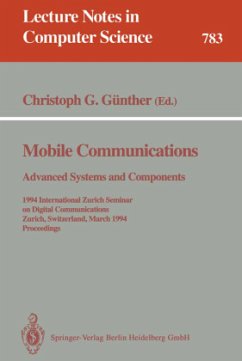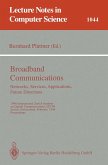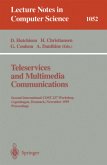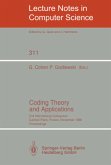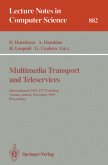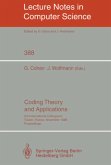Mobile Communications - Advanced Systems and Components
1994 International Zurich Seminar on Digital Communications, Zurich, Switzerland, March 8-11, 1994. Proceedings
Mitarbeit:Günther, Christoph
Mobile Communications - Advanced Systems and Components
1994 International Zurich Seminar on Digital Communications, Zurich, Switzerland, March 8-11, 1994. Proceedings
Mitarbeit:Günther, Christoph
- Broschiertes Buch
- Merkliste
- Auf die Merkliste
- Bewerten Bewerten
- Teilen
- Produkt teilen
- Produkterinnerung
- Produkterinnerung
The Global System for Mobile Communication met with wide acceptance in 1993. Its technical conception has significant advantages over the first generation of cellular systems. Digital European Cordless Telecommunications will provide similar advantages. In Europe, the second generation of wireless communication is established and a Universal Mobile Telecommunications System is currently being conceived. All this leads to a natural subdivision of current research into four categories: new and improved usage of existing standards, signal processing algorithms that are simpler or closer to the…mehr
Andere Kunden interessierten sich auch für
![Broadband Communications: Networks, Services, Applications, Future Directions Broadband Communications: Networks, Services, Applications, Future Directions]() PlattnerBroadband Communications: Networks, Services, Applications, Future Directions41,99 €
PlattnerBroadband Communications: Networks, Services, Applications, Future Directions41,99 €![Teleservices and Multimedia Communications Teleservices and Multimedia Communications]() Teleservices and Multimedia Communications41,99 €
Teleservices and Multimedia Communications41,99 €![Algebraic Algorithms and Error-Correcting Codes Algebraic Algorithms and Error-Correcting Codes]() CalmetAlgebraic Algorithms and Error-Correcting Codes41,99 €
CalmetAlgebraic Algorithms and Error-Correcting Codes41,99 €![Coding Theory and Applications Coding Theory and Applications]() Coding Theory and Applications41,99 €
Coding Theory and Applications41,99 €![Multimedia Transport and Teleservices Multimedia Transport and Teleservices]() HutchisonMultimedia Transport and Teleservices41,99 €
HutchisonMultimedia Transport and Teleservices41,99 €![Applied Algebra, Algebraic Algorithms and Error-Correcting Codes Applied Algebra, Algebraic Algorithms and Error-Correcting Codes]() CohenApplied Algebra, Algebraic Algorithms and Error-Correcting Codes41,99 €
CohenApplied Algebra, Algebraic Algorithms and Error-Correcting Codes41,99 €![Coding Theory and Applications Coding Theory and Applications]() CohenCoding Theory and Applications41,99 €
CohenCoding Theory and Applications41,99 €-
-
-
The Global System for Mobile Communication met with wide acceptance in 1993. Its technical conception has significant advantages over the first generation of cellular systems. Digital European Cordless Telecommunications will provide similar advantages. In Europe, the second generation of wireless communication is established and a Universal Mobile Telecommunications System is currently being conceived. All this leads to a natural subdivision of current research into four categories: new and improved usage of existing standards, signal processing algorithms that are simpler or closer to the optimum, forther development of existing systems, and work that will ultimately lead to new system proposals. This volume presents the proceedings of a seminar at which all these categories were covered.
Hinweis: Dieser Artikel kann nur an eine deutsche Lieferadresse ausgeliefert werden.
Hinweis: Dieser Artikel kann nur an eine deutsche Lieferadresse ausgeliefert werden.
Produktdetails
- Produktdetails
- Lecture Notes in Computer Science 783
- Verlag: Springer / Springer Berlin Heidelberg / Springer, Berlin
- Artikelnr. des Verlages: 978-3-540-57856-7
- 1994.
- Seitenzahl: 588
- Erscheinungstermin: 1. März 1994
- Englisch
- Abmessung: 235mm x 155mm x 32mm
- Gewicht: 872g
- ISBN-13: 9783540578567
- ISBN-10: 3540578560
- Artikelnr.: 09230653
- Herstellerkennzeichnung Die Herstellerinformationen sind derzeit nicht verfügbar.
- Lecture Notes in Computer Science 783
- Verlag: Springer / Springer Berlin Heidelberg / Springer, Berlin
- Artikelnr. des Verlages: 978-3-540-57856-7
- 1994.
- Seitenzahl: 588
- Erscheinungstermin: 1. März 1994
- Englisch
- Abmessung: 235mm x 155mm x 32mm
- Gewicht: 872g
- ISBN-13: 9783540578567
- ISBN-10: 3540578560
- Artikelnr.: 09230653
- Herstellerkennzeichnung Die Herstellerinformationen sind derzeit nicht verfügbar.
Personal communications.- The evolution of GSM.- Integrating data traffic in Enhanced-TDMA digital cellular systems.- The geometric Dynamic Channel Allocation strategy for high traffic FDM/TDMA mobile communications networks.- Performance evaluation of the DECT radio resource management.- The capacity of CDMA cellular: Reverse link field test results.- Adaptive multiuser detector for synchronous code division multiple access applications.- Concatenated coding scheme for reliable data transmission in CDMA cellular systems.- Performance of CDMA cellular networks with base-station antenna arrays.- Joint Frequency-Phase Modulation over Rayleigh fading channels.- Convolutional codes and finite interleavers for the block erasure channel.- Fractional-rate hybrid PSK-TCM codes for the Rayleigh fading channel.- Increased capacity of DS-CDMA mobile systems on frequency-selective slow fading channels.- Design and performance of an 8-dimensional modulation scheme.- Analysis of successive interference cancellation in M-ary Orthogonal DS-CDMA system with single path Rayleigh fading.- Simulation results for a CDMA Interference Cancellation technique in a Rayleigh fading channel.- Matched median detectors for synchronous direct-sequence multiple-access communications.- Cellular spectrum efficiency of a joint detection C/TDMA mobile radio system.- Multiple-symbol differential detection scheme for differential amplitude modulation.- Phase-correcting filter for sub-optimal equalizers.- Performance of adaptive equalization in typical indoor environments including non-linear power amplifiers.- New error probability upper bound on maximum likelihood sequence estimation for intersymbol interference channels.- Bit error probability of a rapidly-adapting rake receiver as a function of dwell time.- Near-far resistant propagation delay estimators for asynchronous direct-sequence code division multiple access systems.- Dynamic cell planning for wireless infrared in-house data transmission.- Frequency response measurements of the wireless indoor channel at infrared optics.- Propagation losses and impulse response of the indoor optical channel: A simulation package.- A 50 Mbit/s optical wireless lan link using novel optical and electronic enabling technologies.- Performance comparison of GMSK and ?/4-DQPSK modulations in a mobile radio environment.- The effect of modulation on the power rating of multi-channel linear amplifiers.- Simulation of GSM data channels in a safety critical railway environment.- A model for BER evaluation of indoor frequency selective channels using multipath measurement results at 2.4, 4.75 and 11.5 GHz.- Measuring bit errors, clock errors and their burst characteristics in mobile communication systems.- Performance of dynamic feedback power control in a TDMA radio system.- Performance of cellular radio systems with power control in varying shadow fading environments.- Power control on the forward link in cellular CDMA.- Performance analysis of a CDMA-based satellite-mobile audio broadcasting system.- Radio protocol architecture of the CODIT UMTS system.- RACE-II advanced TDMA mobile access project An approach for UMTS.- Multitone spread spectrum communication systems in a multipath Rician fading channel.- Slotted ALOHA with capture in a mobile radio environment.- Improved performance of mobile data networks using stack algorithms and receiver capture.- Contention resolution multiple access techniques for handling speech and data traffic on wireless networks.- Certain generalizations on the slotted collision channel without feedback.-Monolithic integration of a spread-spectrum transmitter and receiver front end for Wireless LAN applications.- A bit-serial CMOS digital IF-filter for mobile radio using an on-chip clock.- A 65-MHz digital chip-matched-filter for DS-spread spectrum applications.- Area-efficient viterbi decoders for complex rate-k/n convolutional and trellis codes.- Soft handoff extends CDMA cell coverage and increases reverse link capacity.- An architecture and methodology for mobile-executed cell hand-off in wireless ATM networks.
Personal communications.- The evolution of GSM.- Integrating data traffic in Enhanced-TDMA digital cellular systems.- The geometric Dynamic Channel Allocation strategy for high traffic FDM/TDMA mobile communications networks.- Performance evaluation of the DECT radio resource management.- The capacity of CDMA cellular: Reverse link field test results.- Adaptive multiuser detector for synchronous code division multiple access applications.- Concatenated coding scheme for reliable data transmission in CDMA cellular systems.- Performance of CDMA cellular networks with base-station antenna arrays.- Joint Frequency-Phase Modulation over Rayleigh fading channels.- Convolutional codes and finite interleavers for the block erasure channel.- Fractional-rate hybrid PSK-TCM codes for the Rayleigh fading channel.- Increased capacity of DS-CDMA mobile systems on frequency-selective slow fading channels.- Design and performance of an 8-dimensional modulation scheme.- Analysis of successive interference cancellation in M-ary Orthogonal DS-CDMA system with single path Rayleigh fading.- Simulation results for a CDMA Interference Cancellation technique in a Rayleigh fading channel.- Matched median detectors for synchronous direct-sequence multiple-access communications.- Cellular spectrum efficiency of a joint detection C/TDMA mobile radio system.- Multiple-symbol differential detection scheme for differential amplitude modulation.- Phase-correcting filter for sub-optimal equalizers.- Performance of adaptive equalization in typical indoor environments including non-linear power amplifiers.- New error probability upper bound on maximum likelihood sequence estimation for intersymbol interference channels.- Bit error probability of a rapidly-adapting rake receiver as a function of dwell time.- Near-far resistant propagation delay estimators for asynchronous direct-sequence code division multiple access systems.- Dynamic cell planning for wireless infrared in-house data transmission.- Frequency response measurements of the wireless indoor channel at infrared optics.- Propagation losses and impulse response of the indoor optical channel: A simulation package.- A 50 Mbit/s optical wireless lan link using novel optical and electronic enabling technologies.- Performance comparison of GMSK and ?/4-DQPSK modulations in a mobile radio environment.- The effect of modulation on the power rating of multi-channel linear amplifiers.- Simulation of GSM data channels in a safety critical railway environment.- A model for BER evaluation of indoor frequency selective channels using multipath measurement results at 2.4, 4.75 and 11.5 GHz.- Measuring bit errors, clock errors and their burst characteristics in mobile communication systems.- Performance of dynamic feedback power control in a TDMA radio system.- Performance of cellular radio systems with power control in varying shadow fading environments.- Power control on the forward link in cellular CDMA.- Performance analysis of a CDMA-based satellite-mobile audio broadcasting system.- Radio protocol architecture of the CODIT UMTS system.- RACE-II advanced TDMA mobile access project An approach for UMTS.- Multitone spread spectrum communication systems in a multipath Rician fading channel.- Slotted ALOHA with capture in a mobile radio environment.- Improved performance of mobile data networks using stack algorithms and receiver capture.- Contention resolution multiple access techniques for handling speech and data traffic on wireless networks.- Certain generalizations on the slotted collision channel without feedback.-Monolithic integration of a spread-spectrum transmitter and receiver front end for Wireless LAN applications.- A bit-serial CMOS digital IF-filter for mobile radio using an on-chip clock.- A 65-MHz digital chip-matched-filter for DS-spread spectrum applications.- Area-efficient viterbi decoders for complex rate-k/n convolutional and trellis codes.- Soft handoff extends CDMA cell coverage and increases reverse link capacity.- An architecture and methodology for mobile-executed cell hand-off in wireless ATM networks.

